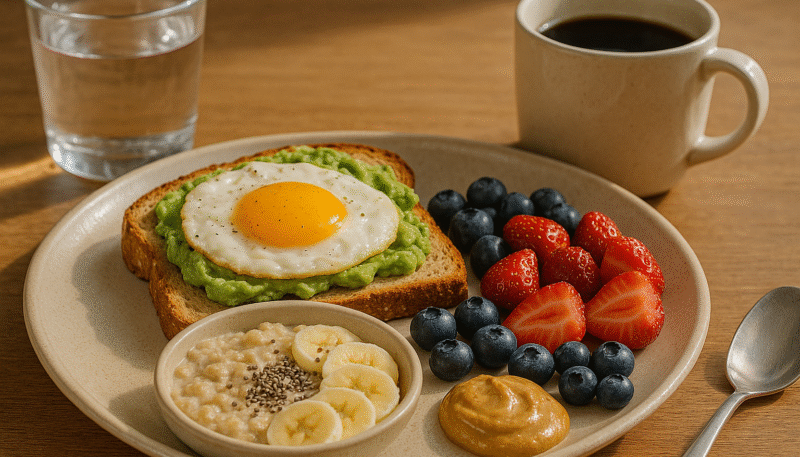Warning: Cannot modify header information - headers already sent in /home/u278635817/domains/mymorninglife.com/public_html/wp-content/plugins/artigosgpt/artigosgpt.php on line 29509
Warning: Cannot modify header information - headers already sent in /home/u278635817/domains/mymorninglife.com/public_html/wp-content/plugins/artigosgpt/artigosgpt.php on line 29509
Imagine starting your day with a meal that doesn’t just satisfy hunger but also ignites your energy and sharpens your mind. Breakfast, often called the most important meal, truly sets the tone for how your body and brain perform from the moment you wake up.
In today’s fast-paced world, knowing what to eat for breakfast is more crucial than ever. The right breakfast fuels your metabolism, sustains your energy, and keeps mental fog at bay, helping you tackle your day with vitality.
This guide dives deep into crafting breakfasts that boost energy, combining taste and nutrition to make your mornings something to look forward to.
Contents
ToggleWhy Breakfast Is Essential for Energy
Breaking the Overnight Fast
After hours without food, your body needs breakfast to replenish glucose, the primary energy source for your brain and muscles. Skipping it can lead to sluggishness and poor concentration.
A well-balanced breakfast kickstarts your metabolism, signaling your body to start burning calories efficiently and maintain energy levels.
Fueling Mental Clarity
Breakfast provides vital nutrients like vitamins and minerals that support cognitive functions such as memory and focus. Without it, brain fog can set in quickly.
Consuming protein and complex carbs early helps stabilize blood sugar, which directly affects alertness and mental sharpness throughout the morning.
Preventing Mid-Morning Slumps
Eating breakfast with the right nutrient mix prevents energy crashes and unhealthy cravings later. This helps maintain steady energy without the need for sugary snacks.
A balanced meal supports steady insulin levels, reducing fatigue and keeping mood stable during busy mornings.
Key Nutrients for an Energizing Breakfast
Complex Carbohydrates
Foods like whole grains and oats release energy slowly, keeping you fueled for hours. They also aid digestion and maintain stable blood sugar.
Including fiber-rich carbs in breakfast promotes fullness and curbs mid-morning hunger pangs effectively.
High-Quality Proteins
Proteins from eggs, yogurt, or nuts help repair tissues and build muscle, contributing to sustained energy and satiety.
Protein slows digestion, preventing spikes and dips in blood sugar that cause fatigue.
Healthy Fats
Avocado, nuts, and seeds provide essential fatty acids that support brain health and prolong energy release.
Incorporating healthy fats in breakfast helps absorb vitamins and keeps you feeling satisfied longer.
Breakfast Foods to Energize Your Morning
Whole Grain Options
Quinoa, whole wheat toast, and brown rice are excellent breakfast staples that offer fiber and nutrients for steady energy.
These grains help balance blood sugar and provide a solid foundation for a nutritious meal.
Protein-Rich Choices
Eggs, Greek yogurt, and cottage cheese are protein-packed options that enhance muscle recovery and maintain alertness.
Adding lean proteins to breakfast wards off hunger and stabilizes energy levels.
Fresh Fruits and Vegetables
Berries, bananas, and spinach add antioxidants, vitamins, and minerals that support immune function and brain health.
Natural sugars in fruit provide a quick, gentle energy boost without the crash.
How to Build a Balanced Breakfast Plate
Combine Macronutrients
Ensure your breakfast includes carbs, protein, and fats in balanced proportions to maximize energy and satiety.
This triad supports metabolic health and keeps cravings in check.
Add Fiber and Micronutrients
Incorporate vegetables, fruits, and whole grains to boost fiber intake and provide essential vitamins and minerals.
Fiber promotes digestive health and micronutrients support overall vitality.
Hydrate Smartly
Start your day with water, herbal tea, or a low-sugar beverage to rehydrate after sleep and aid digestion.
Proper hydration enhances nutrient absorption and helps maintain energy.
Simple Breakfast Recipes for Lasting Energy
Overnight Oats with Berries
Mix rolled oats, Greek yogurt, chia seeds, and fresh berries. Refrigerate overnight for a grab-and-go meal rich in fiber and protein.
This easy recipe provides slow-releasing carbs and antioxidants to fuel your morning.
Veggie Omelette with Whole Grain Toast
Whip eggs with spinach, tomatoes, and mushrooms, then pair with whole grain toast for a protein and fiber-packed breakfast.
It supports muscle repair and keeps blood sugar steady.
Nut Butter Banana Smoothie
Blend banana, almond butter, spinach, and unsweetened almond milk for a creamy, nutrient-dense drink that energizes and satiates.
This smoothie combines healthy fats, carbs, and vitamins for a perfect morning boost.
Common Breakfast Mistakes That Drain Energy
Relying on Sugary Foods
Cereal, pastries, and flavored yogurts can cause blood sugar spikes and subsequent crashes, leaving you tired and hungry.
Opt for natural sugars and fiber-rich foods instead to maintain balanced energy.
Skipping Breakfast Altogether
Going without breakfast can slow metabolism and impair cognitive function, making it harder to focus and stay energized.
Even a small, balanced meal can provide essential fuel to start your day right.
Ignoring Portion Balance
Eating too much or too little can disrupt energy flow. Oversized meals may cause sluggishness, while tiny breakfasts leave you hungry.
Listen to your body’s needs and aim for moderate portions with varied nutrients.
Breakfast and Lifestyle: Enhancing Energy Beyond Food
Regular Meal Timing
Eating breakfast around the same time daily helps regulate your internal clock and metabolism, promoting consistent energy.
Routine supports better hunger cues and digestion.
Incorporate Morning Movement
Light exercise after breakfast boosts circulation and awakens your body, enhancing the energy from your meal.
Simple activities like stretching or a short walk stimulate alertness.
Mindful Eating Practices
Focus on your meal without distractions to improve digestion and satisfaction, preventing overeating or underfueling.
Mindfulness helps you tune into your body’s energy needs effectively.
Breakfast Energy Boost: A Quick Reference Table
| Breakfast Food | Key Nutrients | Energy Benefit |
|---|---|---|
| Oats | Complex carbs, fiber | Sustained energy, fullness |
| Eggs | Protein, healthy fats | Muscle repair, stable blood sugar |
| Avocado | Healthy fats, vitamins | Brain support, longer satiety |
| Greek Yogurt | Protein, probiotics | Gut health, energy stability |
| Berries | Antioxidants, vitamins | Immune boost, mental clarity |
Step-by-Step: How to Create an Energizing Breakfast
- Choose a whole grain base like oats or whole wheat toast.
- Add a good protein source such as eggs, yogurt, or nuts.
- Include healthy fats from avocado, seeds, or nut butter.
- Incorporate fresh fruits or vegetables for fiber and vitamins.
- Drink a glass of water or herbal tea to hydrate.
- Eat mindfully, focusing on your food to optimize digestion and energy.
Conclusion
Breakfast is more than just a morning routine—it’s the foundation for your daily energy and mental clarity. By choosing balanced, nutrient-rich foods and building your meals thoughtfully, you can power through your day with focus and vitality.
Remember the image of a vibrant, energized morning you imagined at the start? With the right breakfast habits, that image can become your everyday reality.
Frequently Asked Questions
Why is breakfast called the most important meal of the day?
Breakfast breaks the overnight fast and replenishes glucose, which is essential for brain function and energy. It jumpstarts metabolism and helps maintain concentration and stamina throughout the day, making it crucial for overall health and performance.
What are the best foods to eat for sustained energy at breakfast?
Foods rich in complex carbohydrates, high-quality protein, and healthy fats provide lasting energy. Examples include oats, eggs, avocado, nuts, and fresh fruits. These nutrients stabilize blood sugar and keep you feeling full and alert until your next meal.
Can skipping breakfast affect my productivity?
Yes, skipping breakfast can lead to decreased energy, poor concentration, and increased fatigue. Without fuel, your brain and body struggle to perform efficiently, which can negatively impact productivity and mood.
How can I make a quick but nutritious breakfast?
Prepare simple meals like overnight oats, smoothies with protein and fruits, or a quick veggie omelette. These options require minimal prep time and provide balanced nutrition to keep you energized throughout the morning.
Is it okay to have something light for breakfast?
Yes, a light breakfast can be effective if it includes a balance of macronutrients—carbs, protein, and fats. Even small portions that combine these elements can sustain your energy and prevent hunger until your next meal.
For more in-depth nutrition advice, visit EatRight.org and the Harvard T.H. Chan School of Public Health.
More Articles




























